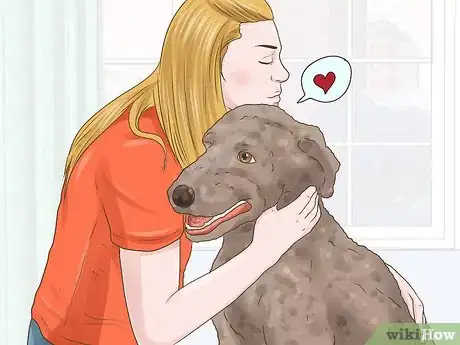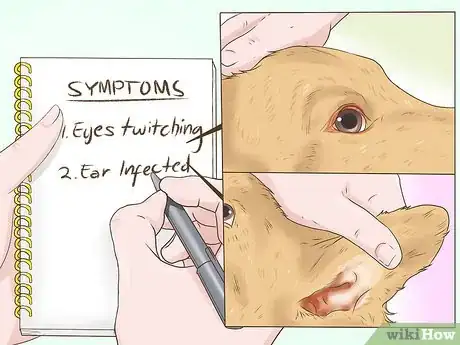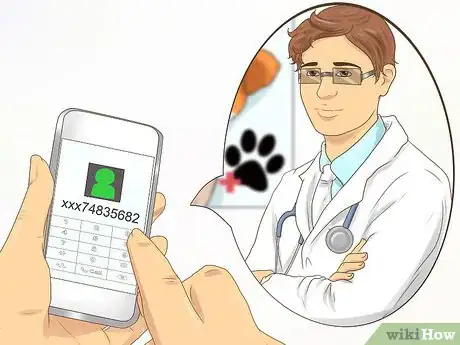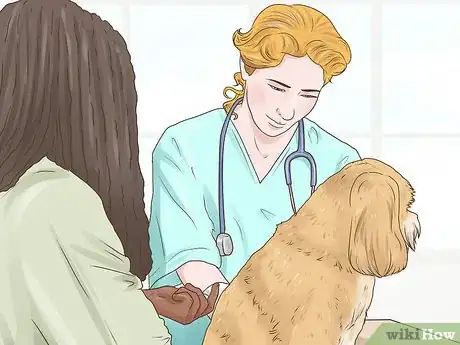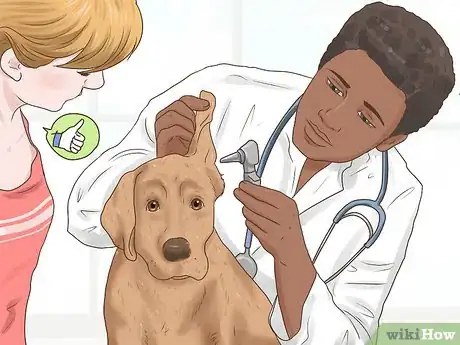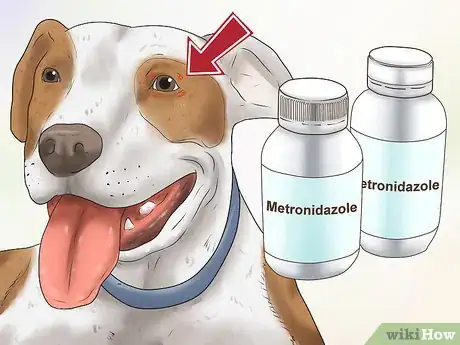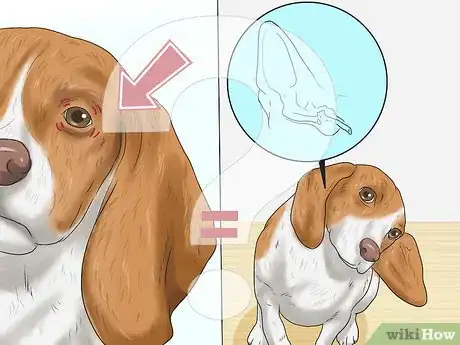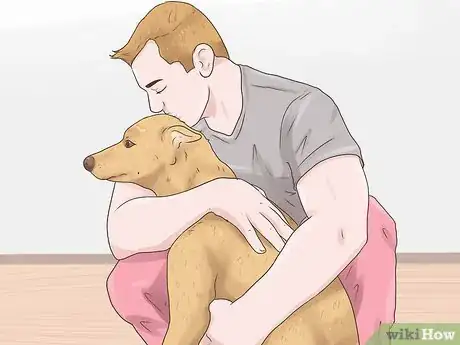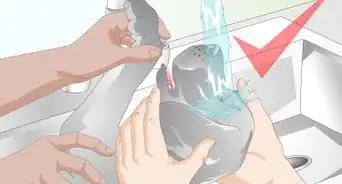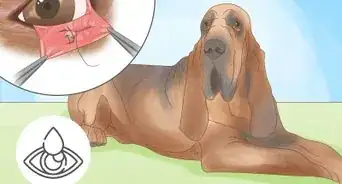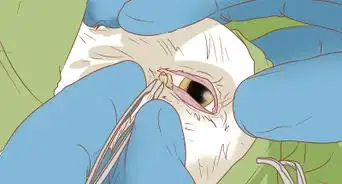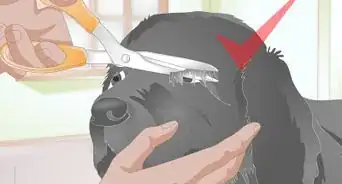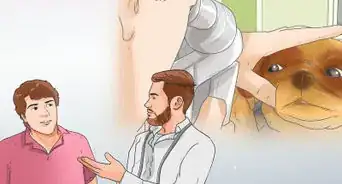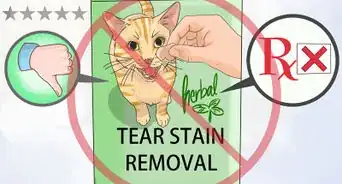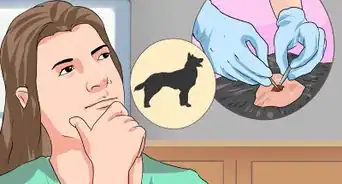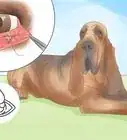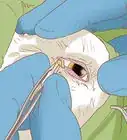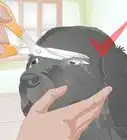This article was co-authored by Pippa Elliott, MRCVS. Dr. Elliott, BVMS, MRCVS is a veterinarian with over 30 years of experience in veterinary surgery and companion animal practice. She graduated from the University of Glasgow in 1987 with a degree in veterinary medicine and surgery. She has worked at the same animal clinic in her hometown for over 20 years.
This article has been viewed 55,219 times.
If your dog has uncontrollable eye twitching you should get veterinary care. Twitching eyes can signal a variety of health problems in dogs. A dog with twitching eyes may be having a bad reaction to medication or maybe having a symptom of an illness. Either way, your dog needs veterinary treatment in order to get the underlying illness or cause under control.
Steps
Giving Immediate Care
-
1Comfort your dog. If your dog is having uncontrolled eye twitching it may become dismayed and agitated. It may lose its balance and fall if the eye twitching is related to a problem in the inner ear. Try to keep the dog calm while you assess its problem and decide what to do.[1]
- This comforting may simply include petting it and using a calming voice to tell it that everything will be fine.
- Part of comforting your dog is making sure it cannot injure itself. Dogs with twitching eyes often have balance issues, so make sure it is in a comfortable laying position where it cannot fall and hurt itself.
-
2Keep track of your dog's symptoms. In order for your veterinarian to more easily give a diagnosis, you should keep track of all of the symptoms your dog is exhibiting. Write down what the symptoms are, along with when they occurred and how often they occurred.
- Keep track of all abnormal behavior and physical problems that occur in conjunction with the eye twitching. They may, or may not, be related.
Advertisement -
3Contact your veterinary office. Call your veterinary office and tell them about the dog's symptoms. Ask to speak to the veterinarian so that you can get a recommendation about whether to bring the dog in right away or if you can wait for the next open appointment.[2]
- If the eye twitching is occurring outside of normal veterinary office hours, then you should contact your local emergency animal hospital.
Getting Veterinary Treatment
-
1Take your dog to a veterinarian. If your dog's eye is repeatedly twitching, you should get the dog checked out by a veterinarian. Eye twitching can have a wide variety of causes, so its best to rely on the expertise of a veterinarian to assess the issue.[3]
-
2Approve veterinary testing. In order for your veterinarian to get to the bottom of the problem, and in order to give a proper diagnosis, they will need to do a variety of tests on your dog. Your veterinarian is likely to start their examination by having you describe the dog's symptoms. Then they will do a physical examination and determine what additional testing needs to occur.
- In many cases of twitching eyes, your veterinarian will take a close look at your dog's ears. Certain types of ear infections can cause the eyes to twitch.
- Testing may include laboratory testing of your dog's blood and imaging of the dog's head.
-
3Determine if eye twitching is a side effect of any medications your dog is taking. Eye twitching can be caused by a bad reaction to medications that are prescribed for your dog. For example, a medication for colitis, called Metronidazole, can have a side effect of uncontrolled eye twitching.[4]
- Discuss the possibility that the twitching is a side effect of medication with your veterinarian. They will be able to research the medication and determine if that is indeed a possibility.
- If the twitching is related to a medication, it should be replaced by a different medication, if possible.
-
4Determine whether eye twitching is a symptom of a disease. In some cases, eye twitching is a symptom of an illness the dog has. For example, eye twitching is a symptom of vestibular syndrome, an illness of the inner ear.
- If your dog is diagnosed with this syndrome, treatment should begin immediately. Treatment for vestibular syndrome usually begins with a dose of antibiotics if an inner ear infection is suspected.
-
5Give supportive care. If the cause of your dog's eye twitching cannot be determined you can still give the dog supportive care. This means keeping it physically comfortable, such as giving it a soft bed to lay on, and keeping it calm.[5]
- For example, if the dog is agitated and uncomfortable, your veterinarian may suggest giving it a sedative to allow it to rest peacefully.
- Additionally, your veterinarian may prescribe medication for nausea. The issues underlying eye twitching can oftentimes cause your dog to become nauseous and refuse to eat.
References
- ↑ http://www.vcahospitals.com/main/pet-health-information/article/animal-health/vestibular-disease-in-dogs/856
- ↑ https://vestibular.org/sites/default/files/page_files/Vestibular%20disease%20in%20dogs%20and%20cats.pdf
- ↑ https://vestibular.org/sites/default/files/page_files/Vestibular%20disease%20in%20dogs%20and%20cats.pdf
- ↑ http://www.merckvetmanual.com/mvm/digestive_system/diseases_of_the_stomach_and_intestines_in_small_animals/colitis_in_small_animals.html?qt=Nystagmus%20dog&alt=sh
- ↑ http://www.vcahospitals.com/main/pet-health-information/article/animal-health/vestibular-disease-in-dogs/856
About This Article
If your dog is suffering from eye twitching, you should take it to your vet as soon as possible for a diagnosis, since eye twitching can be a sign of various health problems. Take note of any other symptoms your dog may have, like infection, fever, or lethargy, to help your vet make an accurate diagnosis. When you take your dog in, your vet will try to identify the underlying cause of its eye twitching and prescribe any medication to help it recover. In the meantime, make sure to comfort your dog by petting it and talking in a calming voice, since it may become stressed and agitated. For more tips from our Veterinary co-author, including how to determine if your dog’s eye twitching is a side effect of other medications, read on!
